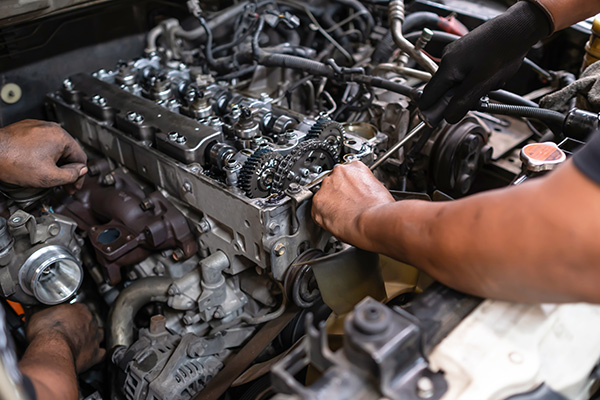
Engines are the most important parts of any vehicle, and they need care and attention to function properly. When your car's engine starts showing signs of wear and tear, an engine overhaul might be on the horizon. But what exactly is an engine overhaul, and how do you know when it's necessary?
What is an Engine Overhaul
An engine overhaul is a comprehensive procedure that involves disassembling the engine, inspecting and cleaning all parts, replacing any damaged or worn components, and reassembling the engine to factory specifications. This process can be likened to giving your engine a fresh start, restoring it to optimal performance levels.
Overhauls can be classified into two types: partial (or top) overhaul and complete (or full) overhaul. A partial overhaul focuses on the upper part of the engine, dealing with components like cylinder heads, valves, and pistons. On the other hand, a complete overhaul involves a full teardown and rebuild of the engine, addressing the upper and lower sections, including the crankshaft and bearings.
Signs Your Engine Might Need an Overhaul
Recognizing the signs that your engine needs an overhaul can save you from costly repairs down the line. Here are some common indicators that it might be time for a thorough engine inspection and possible overhaul:
Excessive Smoke
If your vehicle is emitting thick, dark smoke, it could signal burning oil or a rich fuel mixture, both of which might indicate serious engine problems.
Knocking Noises
Unusual noises, such as knocking or tapping sounds, often point to internal engine issues that need addressing.
Decreased Performance
A noticeable drop in engine performance, including loss of power or acceleration, might mean your engine components are worn out.
Oil Consumption
Frequent need to top off oil or finding oil leaks under your vehicle can indicate internal engine wear.
High Mileage
Engines with over 150,000 miles might require an overhaul as parts naturally wear out over time.
The Overhaul Process: Step-by-Step
An engine overhaul is a meticulous and time-consuming process that requires specialized tools and expertise. Here's a step-by-step overview of what happens during an overhaul:
- Disassembly: The engine is removed from the vehicle and completely disassembled. All components are carefully cataloged to ensure they can be reassembled correctly.
- Inspection: Each part of the engine is inspected for wear and damage. This includes checking the cylinder walls, pistons, valves, and crankshaft.
- Cleaning: All components are thoroughly cleaned to remove carbon deposits, sludge, and other contaminants.
- Replacement: Damaged or worn parts are replaced with new or refurbished components. This can include pistons, bearings, gaskets, and seals.
- Reassembly: The engine is reassembled with precision, ensuring all parts fit together perfectly.
- Testing: Once reassembled, the engine is tested to ensure it operates smoothly and efficiently before being reinstalled in the vehicle.
Benefits of an Engine Overhaul
An engine overhaul offers several advantages, enhancing both the longevity and performance of your vehicle. When you invest in an engine overhaul, you can expect improved performance. A freshly overhauled engine runs more efficiently, delivering better power and responsiveness whether you're accelerating on the highway or navigating city streets.
By replacing worn-out components, an overhaul significantly extends your engine's lifespan. Regular maintenance and timely repairs can prevent major issues, saving you from costly replacements. While the job may seem expensive upfront, it's often more cost-effective than replacing the entire engine or dealing with constant repairs. Think of it as an investment that pays off over time by avoiding more significant expenses.
Furthermore, an overhauled engine can improve fuel efficiency, ultimately saving you money at the pump.
When Is an Overhaul Necessary?
Deciding when to overhaul your engine depends on various factors, including the age of your vehicle, mileage, and the symptoms you're experiencing. Here are some scenarios where an engine overhaul might be necessary:
Severe Engine Damage
If your engine has suffered major damage, such as a blown head gasket or a cracked cylinder head, an overhaul might be required to restore functionality.
Frequent Breakdowns
If your vehicle is constantly breaking down and repairs are becoming frequent and costly, an overhaul can provide a more permanent solution.
Restoration Projects
For classic or high-mileage vehicles, an overhaul can be part of a restoration project to bring the engine back to its original condition.
Performance Upgrades
Enthusiasts looking to boost their vehicle's performance might opt for an overhaul to install high-performance parts and upgrades.
Don't wait for a breakdown. Bring your vehicle to Jeff's Automotive for a thorough engine inspection, repair, or overhaul, ensuring peak performance and longevity.